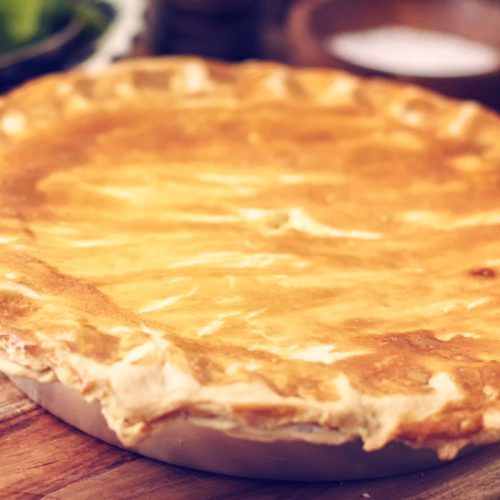
Nothing beats sitting down with a nice cup of tea, but can your cuppa deliver more benefits than just a soothing break? Healthy Food Guide looks at the science to find out why tea is good for you.
They say that a cup of tea solves everything — and if we were to believe all the health hype, we’d be drinking teas and herbal infusions by the litre. Herbalists claim that certain teas can help you sleep better, lose weight and age-proof your skin. So what are the proven health benefits of these wonder brews?
HFG has dived into the latest research and surfaced with plenty of good reasons for you to enjoy a brew.
Types of tea
Did you know that black, green, white, oolong and chai tea varieties all come from the same plant (Camellia sinensis), also known as the tea tree? Chinese researchers recently discovered that the genetic variations of the tea plant are far more numerous than they expected — and about four times more plentiful than that of the coffee plant genome.
Protective antioxidants
True ‘tea’ is rich in antioxidants, which give it its unique flavour. These antioxidants are released when you add the boiling water, so there’s some science behind using the right temperature for your brew. A recent study has found that tea’s antioxidant properties vary according to the way the tea leaves are processed, how long they are ‘steeped’ or immersed in water, and the temperature of that water. A key finding was that white and green tea yield more antioxidants than black.
Black tea
Black tea is made by air-drying tea leaves. This turns the leaves a dark brown colour (much like the way a peeled apple turns brown) and gives black tea its full flavour. It also increases the caffeine content, but — crucially — air-drying also lowers the level of antioxidants. And the longer you steep black tea in hot water, the more the tea’s antioxidants reduce. So to reap the maximum antioxidants, infuse black tea for less than two minutes.
Green tea
Green tea leaves are steamed and rolled, resulting in a high concentration of antioxidants. Look out for matcha tea, a vibrant green powder made from finely ground green tea leaves which are very high in antioxidants. Researchers have found green tea antioxidants to be highly temperature sensitive, and recommend you steep the tea for two hours in cold water. Yes, cold water for two hours!
So chill out and enjoy an iced tea.
White tea
White tea is the antioxidant hero, made from the buds and first leaves of the tea plant. It’s less processed than black and green teas, which may in part contribute to white tea’s greater antioxidant capacity. Evidence suggests that the longer you brew white tea (rather than the temperature of the brew), the more antioxidants you’ll gain
Are herbal teas good for you?
Herbal teas like chamomile and peppermint are made from the flowers, bark and roots of fruit plants and herbs. Most will be caffeine free, unless they contain tea leaves. Many of the health claims made for herbal teas are yet to be quantified by science. Nevertheless, there are plenty of good reasons to give them a try (see story opposite).
How much tea is too much?
Tea has less than half as much caffeine as coffee. Five to six cups of tea each day contain about 300mg of caffeine, which most people can tolerate.
The variety of your tea, and whether it is loose leaf or ground, can also vary the concentration and the amount of antioxidants.
Remember, the effects of caffeine last for more than five hours. So if you have trouble sleeping, it’s best to stop drinking tea after lunchtime, or switch to a caffeine-free herbal variety such as rooibos.
Like coffee, tea can be a diuretic, causing you to produce more urine — another good reason to avoid drinking it right before bed.
7 reasons to pour a cuppa
- A cup of tea is a great way to boost your fluid intake throughout the day.
- If you struggle to fall asleep at night, many herbal teas are caffeine-free swaps for afternoon coffee.
- Tea is naturally sugar free, so chilled herbal tea makes a cool, refreshing alternative to sugary drinks.
- If you’re on a dairy-free diet but don’t like black tea or black coffee, herbal teas are the brew for you.
- It has virtually no kilojoules, unlike creamy coffees and hot chocolates.
- Herbal teas are relaxing to sip alone, at work or with friends and family.
- Tea tastes delicious! Try one of these healing herbal varieties (right) and you’ll never look back.
Herbal teas for specific conditions
To lower your blood pressure… try hibiscus tea
A small study found that drinking three cups of hibiscus tea per day for six weeks was effective in lowering blood pressure among adults whose levels were in the pre-high blood pressure range. However further studies are required, and hibiscus tea is certainly not a substitute for medication.
To soothe digestion… try peppermint tea
We’re getting closer to understanding the properties in peppermint oil that help relax the gut. Researchers from the University of Adelaide found that peppermint activates an ‘anti-pain’ channel in the gut, potentially soothing Irritable Bowel Syndrome.
To calm your mind… try chamomile tea
Chamomile tea has gained a reputation for helping people unwind for a good night’s sleep, and there’s some scientific basis for its calming effect. One study found that chamomile extract capsules eased anxiety, while another study found drinking the tea helped some women who recently gave birth and were prone to the baby blues. Tea leaf size can affect brew strength: for a more relaxing cup, swap tea bags for loose-leaf.
To reduce inflammation… try turmeric tea
Inflammation in the body can be caused by stress and contributes to chronic diseases from joint problems to diabetes. But the yellow pigments in turmeric, especially one known as curcumin, have strong immune-boosting, anti-inflammatory and antioxidant properties to help reverse these conditions. Many turmeric teas also contain black pepper to enhance curcumin absorption, or have green tea for extra antioxidants.
Article sources and references
- Amsterdam et al. 2009. A randomized, double-blind, placebo-controlled trial of oral Matricaria recutita (chamomile) extract therapy for generalized anxiety disorder. J Clin Psychopharmacol. 29(4): 378–382.https://pubmed.ncbi.nlm.nih.gov/19593179/
- Better Health Channel. 2012. Tea leaves and health. Accessed June 2017https://www.betterhealth.vic.gov.au/health/healthyliving/caffeine
- Chang et al. 2015. Effects of an intervention with drinking chamomile tea on sleep quality and depression in sleep disturbed postnatal women: A randomized controlled trial. J Adv Nurs. 72(2): 306–315.https://pubmed.ncbi.nlm.nih.gov/26483209/
- Hajiaghaalipour et al. 2015. Temperature and time of steeping affect the antioxidant properties of white, green, and black tea infusions. J Food Sci. 81(1): H246–H254.https://pubmed.ncbi.nlm.nih.gov/26613545/
- Srivastava et al. 2010. Chamomile: A herbal medicine of the past with bright future. Molecular Medicine Reports. 3(6): 895–901.https://www.ncbi.nlm.nih.gov/pmc/articles/PMC2995283/
- Xia et al. 2017. The tea tree genome provides insights into tea flavor and independent evolution of caffeine biosynthesis. Molecular Plant. 10(6): 866–877https://www.cell.com/molecular-plant/pdf/S1674-2052(17)30103-X.pdf
www.healthyfood.com










